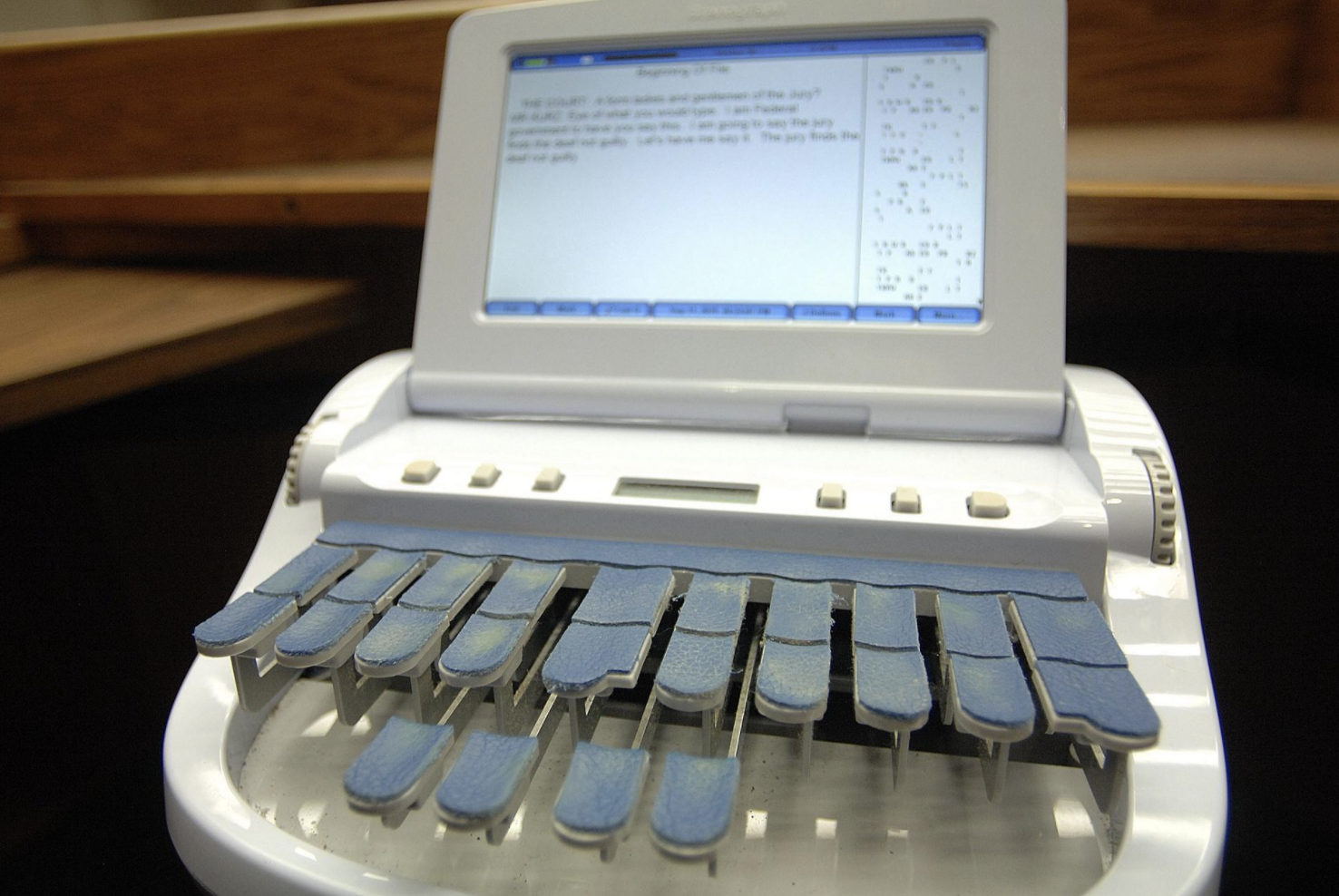Why a Court Typist Is Essential in Judicial Hearings
Why a Court Typist Is Essential in Judicial Hearings
Blog Article
Discover the Necessary Abilities and Responsibilities of a Court Typist in Today's Legal Landscape
As a court typist, you hold a crucial setting in the lawful system. Your skills exceed simply keying; they involve recognizing intricate legal terms and procedures while ensuring precision in every record. You team up carefully with judges and attorneys, making your duty crucial for reliable interaction. What particular skills do you require, and exactly how can you adjust to the ever-evolving technological landscape? Allow's explore this better.
The Duty of a Court Typist in the Judicial System
As the foundation of the judicial system, a court typist plays an essential duty in guaranteeing that legal proceedings are properly recorded. You're responsible for recording whatever from witness testaments to courts' rulings, capturing every detail with precision. Your work aids maintain a clear and long-term document of court activities, which is critical for future referral and appeals.In the court, you're often the unhonored hero, quietly guaranteeing that all spoken words come to be written records. You keep discretion, comprehending the delicate nature of legal issues. You also collaborate closely with attorneys, judges, and clerks to assure the smooth flow of information. By working successfully under pressure, you contribute to the total performance of the judicial procedure. Your attention to information and commitment to precision not only copyright the integrity of the court but likewise sustain the wider quest of justice in culture.
Vital Abilities Needed for Court Typists
Court typists need a distinct blend of skills to master their important role within the judicial system. Primarily, you should have exceptional inputting abilities, typically accomplishing speeds of 70 words per min or more. Accuracy is important; even a small mistake can lead to considerable misunderstandings in lawful papers. You'll additionally require strong focus to information, making sure every word is transcribed correctly.Additionally, great business skills are crucial for handling several cases and records efficiently. Being tech-savvy is vital, as you'll use numerous software program programs for data processing and paper management. Strong interaction abilities aid you connect with judges, legal representatives, and various other court employees effectively.Lastly, a feeling of professionalism and discretion is a must, as you'll deal with sensitive info daily. By honing these abilities, you'll be well-prepared to contribute substantially to the court environment.
Comprehending Lawful Terms and Procedures
As a court typist, you need to understand essential lawful terms and procedures to execute your work successfully. Understanding these principles not only aids you record accurately but likewise ensures you can adhere to the circulation of court procedures. Allow's discover the necessary lawful vocabulary and a summary of court procedures you ought to recognize.

Secret Legal Terms
Recognizing essential lawful terms is vital for any person functioning in a courtroom setting. You'll frequently encounter terms like "plaintiff," which describes the person initiating a claim, and "defendant," who replies to the accusations. Understanding the distinction between "civil" and "criminal" situations helps you realize the context of the procedures. Knowledge with "subpoena" guarantees you understand the legal records compelling witnesses to testify. Furthermore, terms like "evidence" and "testament" are important, as they connect directly to the details offered in court. Understanding these terms not just boosts your efficiency as a court typist but additionally ensures that you add to the accuracy and quality of legal papers. Your role rests on specific terminology, so don't take it lightly!
Court Procedures Overview
Knowledge with vital lawful terms establishes the phase for understanding court treatments. Recognizing just how a courtroom functions is vital for any kind of court typist. You'll encounter processes like accusations, where defendants listen to costs, and motions, which are ask for a court ruling. Familiarize yourself with the roles of staffs, attorneys, and courts, as each plays an important component in proceedings. Understanding the flow of a trial-- from court selection to closing debates-- aids you precisely catch the proceedings - court typist. In addition, understanding the value of keeping a unbiased and precise document can not be overemphasized. By understanding these elements, you'll boost your efficiency in documenting important court activities and add considerably to the legal procedure. Your duty is essential in preserving the honesty of court documents
The Effect of Innovation on Court Entering
Technology's changed court typing in considerable ways. With digital transcription tools, you can raise performance and precision, making your job less complicated than ever. And also, remote court process have actually altered how you approach your work, needing flexibility to brand-new formats and technologies.
Digital Transcription Devices
As digital transcription tools remain to evolve, they're changing the way court typists do their obligations. These tools simplify the transcription process, permitting you to capture talked words precisely and successfully. With voice recognition software program, you can transcribe real-time procedures, decreasing hand-operated input and minimizing errors.Moreover, cloud-based systems allow simple access to papers, so you can work collaboratively with lawful teams and assure everybody's on the very same page. Automated format attributes save you time on recurring jobs, allowing you concentrate on content quality.Additionally, digital tools boost protection, protecting delicate info via encrypted storage and controlled access. By accepting these modern technologies, you can boost your productivity and preserve the high requirements called for in the lawful area.
Remote Court Proceedings
The surge of remote court process has substantially changed the landscape for court typists. You now depend on innovation to record and transcribe live hearings from your office or home. Familiarity with video clip conferencing platforms is important, as you'll need to browse them seamlessly to guarantee an exact record. You'll also need to handle audio quality, as background noise or connection concerns can interrupt your job. In addition, remote process require fast reasoning; you might require to clarify declarations or request repeats in real-time. Staying arranged and reliable is important, as due dates continue to be limited. Welcoming these technological innovations not just boosts your abilities yet also guarantees you continue to be a very useful property in today's evolving legal environment.
Accuracy and Interest to Detail in Transcription
Accuracy and attention to detail are essential in transcription, especially for court typists. court typist. When you're transcribing legal procedures, every word counts. A solitary error can modify the meaning of a statement, potentially influencing the outcome of a case. You should listen meticulously, guaranteeing that you record every subtlety and inflection in the audio speaker's voice.Your capacity to capture typos and grammatic mistakes is essential. You do not just type; you verify that the last record is an accurate depiction of what was said in court. This calls for an eager eye and an extensive understanding of lawful terminology.Moreover, you'll need to be knowledgeable about various accents and talking styles, additional reading as court rooms can host a variety of audio speakers. By sharpening your accuracy and interest to information, you'll keep the stability of legal records and contribute considerably to the judicial procedure. Your diligence in this location truly makes a difference

Time Administration and Business Skills
While managing numerous tasks, efficient time administration and business abilities are vital for court typists. You'll usually manage various due dates, from transcribing court procedures to preparing legal documents. Prioritizing your workload is essential; recognize urgent jobs and tackle them initially to guarantee timely submissions.Organizational skills enter into play when you're sorting via case files, notes, and records. Maintaining every little thing nicely categorized not just saves time but also reduces the danger of mistake. Making use of devices like schedules, to-do lists, or specialized software program can aid you remain on track and manage your time effectively.Moreover, establishing specific goals for each and every job session can increase your efficiency. Break larger tasks right into smaller sized tasks to make them extra convenient. By sharpening these abilities, you'll not just boost your effectiveness however likewise add significantly to the smooth operation of the legal process, assuring every little thing runs like clockwork.
Continuing Education And Learning and Expert Advancement Opportunities
Purchasing your abilities doesn't quit with time management and organization. As a court typist, you'll find that continuing education and learning and specialist advancement are necessary to staying competitive in the lawful field. Try to find workshops or on-line programs concentrating on sophisticated inputting techniques, legal terms, and transcription software program. These can hone your skills and aid you adjust to the newest technologies.Networking is just as essential. Join expert organizations like the National Court Reporters Association (NCRA) or regional lawful associations. They often use sources, training sessions, and seminars that can improve your expertise and link you with peers.Don' t fail to remember regarding certification programs that can boost your reliability and marketability. Remaining updated with the newest trends and best techniques in legal documents will certainly boost your performance and precision, making you a vital possession to any legal group. Invest in your development, and you'll gain the incentives throughout your profession.
Often Asked Questions
What Is the Regular Wage Range for a Court Typist?
A court typist's common salary varieties from $30,000 to $55,000 each year, relying on experience and location. You might additionally find possibilities for growth with extra abilities, leading to increased pay in the lawful field.

Are Court Typists Required to Have a Lawful Level?
Court typists do not require a lawful level, but having one can be beneficial. You'll typically discover that solid keying abilities and knowledge of lawful terms are more vital for success in this duty.
What Are the Job Hours for a Court Typist?

How Do Court Typists Guarantee Confidentiality in Their Work?
You ensure discretion by securely managing delicate documents, making use of encrypted software, and following strict protocols. You remain aware of privacy laws and only share details with accredited workers, keeping rely on the judicial procedure.
Can Court Typists Work Remotely or Freelance?
Yes, you can work from another location or freelance as a court typist, specifically if you have reputable technology and a protected setting. Numerous lawyers currently welcome remote job, using flexibility and possibilities for independent typists. As the foundation of the judicial system, a court typist plays a crucial duty in guaranteeing that legal procedures are precisely recorded. As a court typist, you require to grasp key lawful terms and treatments to perform your work properly. Understanding these terms not just improves your effectiveness as a court typist yet likewise assures that you contribute to the precision and quality of legal records. The increase of remote court process has content actually substantially transformed the landscape for court typists. As a court typist, you'll find that proceeding education and learning and professional growth are vital to staying affordable in the lawful area.
Report this page